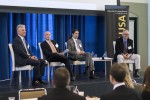Speakers and panelists discussed the 2016 presidential election and responses to global terrorism, among other topics, at a Friday conference that focused on the relationship between the United States and Australia.
About 100 people gathered in Covel Commons for the third U.S.-Australian Dialogue on Cooperation in the Asia-Pacific. Kal Raustiala, director of the UCLA Burkle Center for International Relations, interviewed Australian Minister for Foreign Affairs Julie Bishop, the event’s keynote speaker, about tensions in the South China Sea, the Trans-Pacific Partnership, or TPP, and the roles of China and the United States in the region.
Bishop said she would like to see Congress ratify the TPP to improve the United States’ relationship with Pacific countries. She added she thinks the U.S. has an important role to play in the region, and the U.S. should engage more with other countries to establish rules and international norms for the region.
“The U.S. can also engage in more trilateral discussions with Australia, between nations like Japan, or maybe India,” Bishop added.
Animal rights activists protesting Australia’s involvement in the practice of exporting live animals briefly interrupted the interview session.
The event also featured several panel discussions about various aspects of the U.S.-Australia relationship. One panel focused on the TPP, a trade agreement between 12 countries around the Pacific Rim that produces about 40 percent of global output.
Panelists also discussed China’s increasing interest in joining the TPP. Jeffrey Bleich, former United States Ambassador to Australia, said he thinks China’s addition to the TPP would be beneficial, but China’s censorship policies may generate internal opposition.
Several professors and political analysts discussed the 2016 presidential election and possible repercussions in the Pacific. Members of the panel included Robert O’Brien, a Republican foreign policy expert, and David Smith, an American politics professor at the University of Sydney, among others.
O’Brien shared his thoughts about each Republican candidate’s foreign policy toward the Pacific region, based on what they shared in their campaign platforms. Smith said he thinks name recognition, not foreign policy, plays a big role in what the Australian public thinks about the U.S. election.
Another panel focused on terrorism and the implications of the U.S.-Australian alliance. Bleich said he thinks countries can reduce the number of people terrorist organizations recruit over the internet by restricting access to images and videos.
He added he thinks the internet plays a strong role in radicalizing the youth, because videos posted online on sites like Twitter often use images to convey a sense of belonging, family and purpose, which may draw people in.
“The biggest problem is the kid who lives down the street who’s never gotten in any trouble, who idolizes from afar and takes on his own research,” he said.
Bleich added he thinks the U.S. and other countries in the world must break down trust barriers to fight terrorism and create more partnerships in the world.
Several UCLA academic organizations, including the Burkle Center for International Relations, the International and Comparative Law Program at the UCLA School of Law and the Australian Department of Foreign Affairs and Trade, sponsored the conference.
